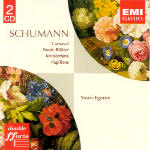Just about all of Youri Egorov’s Schumann recordings are excellently remastered for this two-for-one reissue. Without exception the performances attest to the tragically short-lived pianist’s deep affinity for this composer’s volatile, poetic style. True, the chromium-plated reverberance could not be removed from EMI’s early digital engineering in the Carnaval, Toccata, and Papillons, but these 1981 sessions sound a little less strident and more robust than in previous CD editions. The whimsical Papillons take on monumental shapes, yet Egorov’s ravishing voicings, hypnotic legato, and breathtaking pedal effects prevent the music from lapsing into ponderousness. Likewise, Egorov welds Carnaval’s mini-movements into a symphonic unity in the manner of Michelangeli’s awesomely detailed, slightly aloof versions, but with infinitely more charm. Like Richter, Egorov not only nails the thorny Toccata with easy authority but also honors the composer’s wish to loudly recap the main theme, a marking many pianists ignore. Egorov’s luscious timing in the coda of the Arabesque caps a sensitive, graceful reading, almost in a class with Rubinstein’s priceless Carnegie Hall version (RCA).
Of the few pianists who’ve essayed the complete Bunte Blätter on disc, Egorov’s strongly characterized readings take top honors, though I keep returning to Richter’s unassailable mastery and lighter touch in the more densely scored selections. Both Novelletes, however, match Richter at his own powerful game, and then some. For me, the prize of this compilation is Egorov’s extraordinary Kreisleriana. He brings unrelenting intensity and concentrated articulation to the tumultuous first and seventh movements, and takes the third movement’s Molto Agitato marking on faith. The slow movements, by contrast, have enormous breadth, freedom, and color. The off-beat accents in the final movement sound ghostly and unsettled rather than petulant and quirky. Granted, the 1978 sound is a bit clangy, but that’s also true of the Horowitz (Sony) and Argerich (DG) reference versions–my favorites along with both Kempffs (DG), Perahia (Sony), Ashkenazy’s 1971 traversal (Decca), and Cortot (Philips). Now that Egorov’s Kreisleriana is back, it rejoins this stellar list, where it belongs.
































